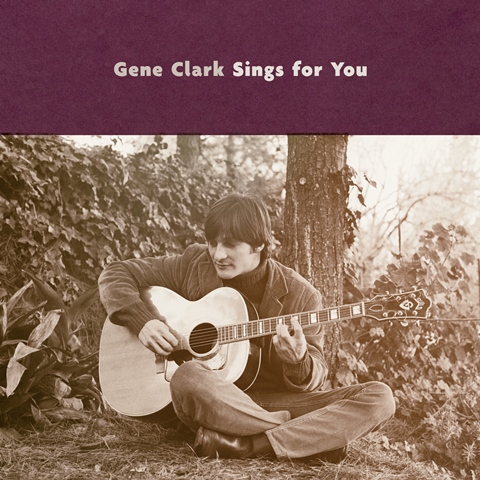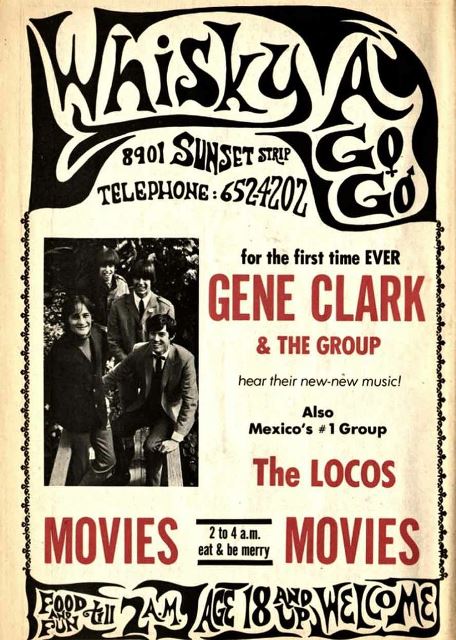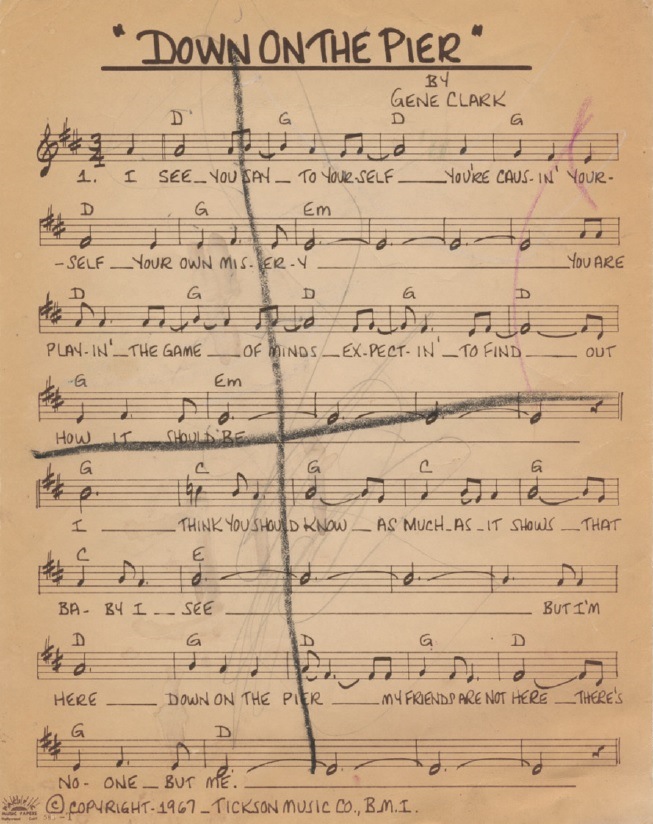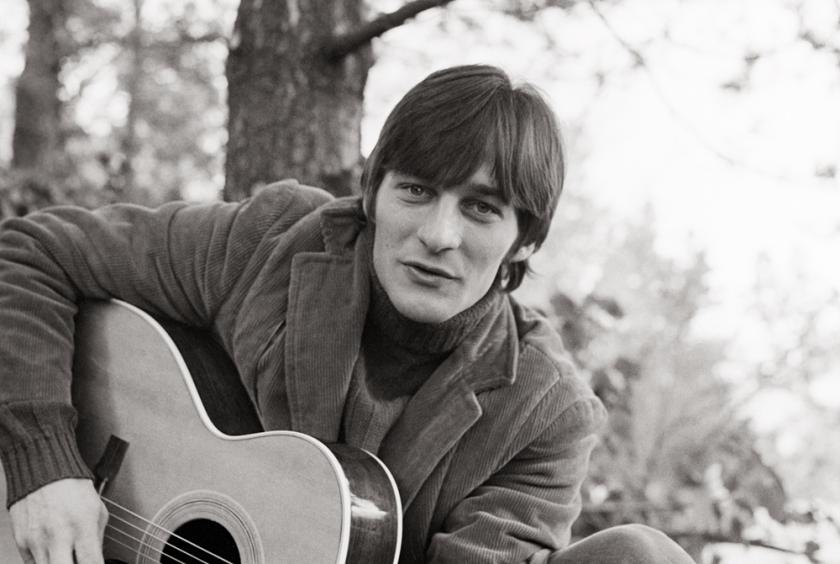“Past My Door” weaves together a series of leitmotifs. Beginning as a downbeat, mid-tempo shuffle, it then shifts into a staccato passage after which the tempo picks up before a more pacey section. Next, the character established at the song’s introduction returns. Over four-minutes 20 seconds, the different approaches are supported by oblique lyrics which include the memorable phrase “too late, cries the melting snowman". At its core, the melancholy “Past My Door” seems to be about missing chances and being left behind.
This remarkable portmanteau composition is one of the many highlights of Gene Clark Sings For You, an essential 14-track collection of demos recorded by the former Byrds’ lynch-pin in – according to its annotation – 1967. Nothing is previously issued and the title is taken from that of an acetate which originally featured the new release’s first eight tracks.
 While the ...Sings For You acetate was made to secure a recording contract, the compilation of the same name features a further five songs from another acetate: one given by Clark to a member of the band The Rose Garden – who recorded versions of his otherwise unreleased songs on their sole album. More on The Rose Garden next week. The 14th and final track is Clark’s demo of “Till Today”, another song of his recorded by The Rose Garden.
While the ...Sings For You acetate was made to secure a recording contract, the compilation of the same name features a further five songs from another acetate: one given by Clark to a member of the band The Rose Garden – who recorded versions of his otherwise unreleased songs on their sole album. More on The Rose Garden next week. The 14th and final track is Clark’s demo of “Till Today”, another song of his recorded by The Rose Garden.
Back in the Sixties, Gene Clark’s trajectory seemed simple. Although integral to The Byrds, he left them in early 1966 and then formed an unrecorded band named Gene Clark and the Group, after which he made the superb solo Gene Clark with the Gosdin Brothers album for Columbia (The Byrds’ label – it was a solo album, however misleadingly it was credited). Following its release in 1967, he and Columbia parted ways. In late 1968, he re-emerged on A&M with the explicitly country Fantastic Expedition of Dillard and Clark album; one that actually was a collaboration The waters were somewhat muddied by odd songs of his cropping up albums by the actor David Hemmings and The Rose Garden.
Things were not so simple – as the release of Gene Clark Sings For You underlines. Clark had been central to a band which redefined popular music and pushed it forward. Although The Byrds were influenced by Dylan and The Beatles (The Searchers too), the feedback loop they established impacted directly on their inspirations. Clark’s last recording sessions with The Byrds were on 24 & 25 January 1966 (“Eight Miles High” and “Why” were taped) and 21 February (shelved/unfinished takes of “I Know My Rider” and “John Riley”). He left the band on 22 February. By the time their “Eight Miles High” single was in the shops on 14 March, The Byrds had lost a key member.
 Thereafter, he spent some time away from Los Angeles and then formed Gene Clark and the Group, a quartet introduced to the world at the Whisky A Go-Go in June and July 1966 (pictured left: an ad for the shows). He did not, it seems, tape anything for release with them but instead began a country tinged solo album of baroque-pop for Columbia, recorded in October and November 1966. It was issued in February 1967 by Columbia at the same time as The Byrds’ Younger Than Yesterday. Clark's former Byrds band-mates Michael Clarke and Chris Hillman played on his album yet it was clear that, for his label, he was of less concern than the band he had left.
Thereafter, he spent some time away from Los Angeles and then formed Gene Clark and the Group, a quartet introduced to the world at the Whisky A Go-Go in June and July 1966 (pictured left: an ad for the shows). He did not, it seems, tape anything for release with them but instead began a country tinged solo album of baroque-pop for Columbia, recorded in October and November 1966. It was issued in February 1967 by Columbia at the same time as The Byrds’ Younger Than Yesterday. Clark's former Byrds band-mates Michael Clarke and Chris Hillman played on his album yet it was clear that, for his label, he was of less concern than the band he had left.
Even so, a session with Byrds manager Jim Dickson (as producer), Leon Russell (who worked on Clark’s album) and Hugh Masekela (who had recorded with The Byrds) was undertaken in January 1967 before the album was out. A single of "Back Street Mirror" and "Don't Let It Fall Through" was mooted. None of the tracks were released at the time but the backing track for “Back Street Mirror” was repurposed for the David Hemmings album. Unadulterated – and amazing – recordings from the session have been issued recently.
In April, Columbia paid for Clark to make another potential single but that too was shelved (the two tracks, a cover of Ian & Sylvia's “The French Girl” and Clark’s own “Only Colombe” first surfaced in 1991). The label let him go in June. One of the most distinctive and original singer-songwriters of the era without an outlet in a period when Tim Buckley, Leonard Cohen, Tim Hardin and others were showing that individualism was to be cherished rather than rejected. Still plugging away, Clark taped demos of eight of his songs at the end of 1967 in the hope of signing to a new label. They were pressed on acetates which were duly circulated
Liberty Records was amongst the recipients of the Gene Clark Sings For You acetate. These eight wonderful tracks, although recorded in a bare-bones fashion in December 1967, show that Clark was still viable as a solo artist. He was not picked up by a label and emotive, sinuous songs such as “Past Tense”, “That’s Alight” and “Yesterday, Am I Right” were not released.
 Intriguingly, two of the songs from the …Sings For You acetate – “One Way Road” and “Down On The Pier” (pictured right: the sheet music for “Down On The Pier”) – were copyrighted on 21 April 1967, the same date as “Only Colombe” was registered. Perhaps they were in the frame to be recorded for Columbia? “Yesterday, Am I Right”, also on the acetate, had previously been recorded at the Russell/Masekela session while Clark was still under contract to Columbia, so it seems that more was going on over January to April 1967 than the preparation of two proposed singles. This inference is not discussed in the liner notes of the new release.
Intriguingly, two of the songs from the …Sings For You acetate – “One Way Road” and “Down On The Pier” (pictured right: the sheet music for “Down On The Pier”) – were copyrighted on 21 April 1967, the same date as “Only Colombe” was registered. Perhaps they were in the frame to be recorded for Columbia? “Yesterday, Am I Right”, also on the acetate, had previously been recorded at the Russell/Masekela session while Clark was still under contract to Columbia, so it seems that more was going on over January to April 1967 than the preparation of two proposed singles. This inference is not discussed in the liner notes of the new release.
Even more fascinating are the five tracks from the acetate given to The Rose Garden’s John Noreen. In the liner notes, he says it was dated 1966 but Gene Clark Sings For You’s annotation gives it a 1967 date (it is not illustrated). Considering that the five compositions were registered for copyright on 31 October 1966, the earlier date seems more likely. Therefore, these tracks appear to pre-date the recording of Gene Clark with the Gosdin Brothers. This supposition is supported by “Big City Girl” and “Doctor Doctor”, the final pair of tracks of the five. Unlike anything else here, they feature a full electric band which sounds like a four-piece outfit. It cannot be certain if this is Gene Clark and his Group (the liner notes do not go into this either), but these must be the earliest post-Byrds recordings by Clark to have surfaced. As such, they are important.
“Big City Girl” is a blues-based workout which would have worked well live but does not sit comfortably with anything else Clark is known to have recorded or written over 1966 and 1967 after departing The Byrds. “Doctor Doctor” though is mind-blowing. With its drifting vocal harmonies, otherworldly atmosphere, spindly lead guitar line, sudden shifts from circularity into hard-edged rhythms and John Coltrane-influenced outro guitar solo, it is what the psychedelicised Byrds could have done after “Eight Miles High” had Clark still been with them.
As is evident, Gene Clark Sings For You makes the listener work hard to understand what is being heard and raises questions it does not answer. However, its first eight tracks – the ones certainly recorded after Gene Clark with the Gosdin Brothers – suggest what a putative second solo album might have been like. Based on these demos, it would have been a haunted, haunting masterpiece. And tantalisingly, there is also an intimation of what Clark was doing in the run-up to Gene Clark with the Gosdin Brothers. All of which means this is – so far – 2018’s most noteworthy archive release.
- Next week: Bonus-stuffed reissue of the sole album by the Gene Clark-favoured Rose Garden
- Read more reissue reviews on theartsdesk















Add comment